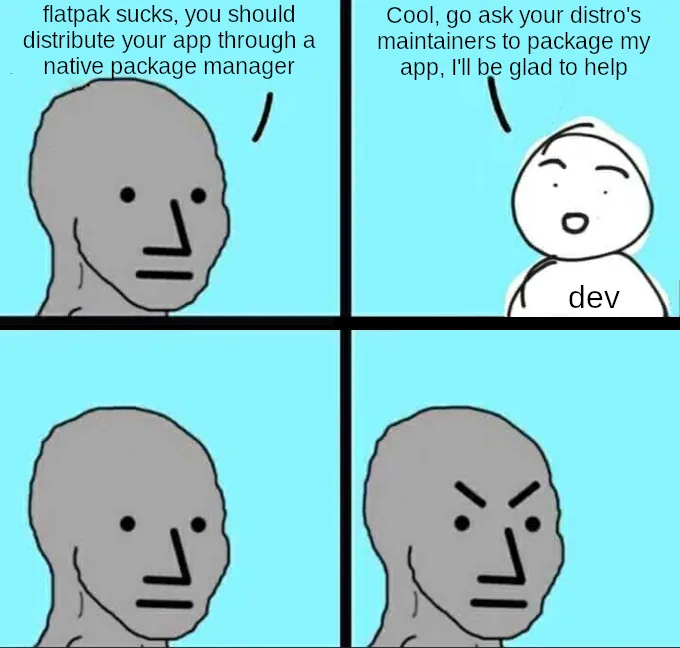this post was submitted on 05 Jul 2024
743 points (94.0% liked)
linuxmemes
21410 readers
789 users here now
Hint: :q!
Sister communities:
Community rules (click to expand)
1. Follow the site-wide rules
- Instance-wide TOS: https://legal.lemmy.world/tos/
- Lemmy code of conduct: https://join-lemmy.org/docs/code_of_conduct.html
2. Be civil
- Understand the difference between a joke and an insult.
- Do not harrass or attack members of the community for any reason.
- Leave remarks of "peasantry" to the PCMR community. If you dislike an OS/service/application, attack the thing you dislike, not the individuals who use it. Some people may not have a choice.
- Bigotry will not be tolerated.
- These rules are somewhat loosened when the subject is a public figure. Still, do not attack their person or incite harrassment.
3. Post Linux-related content
- Including Unix and BSD.
- Non-Linux content is acceptable as long as it makes a reference to Linux. For example, the poorly made mockery of
sudoin Windows. - No porn. Even if you watch it on a Linux machine.
4. No recent reposts
- Everybody uses Arch btw, can't quit Vim, and wants to interject for a moment. You can stop now.
Please report posts and comments that break these rules!
Important: never execute code or follow advice that you don't understand or can't verify, especially here. The word of the day is credibility. This is a meme community -- even the most helpful comments might just be shitposts that can damage your system. Be aware, be smart, don't fork-bomb your computer.
founded 1 year ago
MODERATORS
you are viewing a single comment's thread
view the rest of the comments
view the rest of the comments

Flatpaks aren't perfect, but I think it's a good solution to the fragmentation problem that is inherent to Linux.
Precisely. Flatpaks solve an important problem. Perfect should not be the enemy of good.
Binary compatibility is a sad story on Linux, and we cannot expect developers — many of whom work for free — to package, test, debug, and maintain releases for multiple distributions. If we want a sustainable ecosystem with diverse distributions, we must answer the compatibility question. This is a working option that solves the problem, and it comes with minor security benefits because it isolates applications not just from the system but from each other.
It’s fair to criticize a solution, but I think it’s not fair to ignore the problem and expect volunteers to just work harder.
Also companies are lazy and if we don't want to be stuck on Ubuntu for proprietary app stability. We should probably embrace something like flatpak. Also when companies neglect their apps, it'll have a better chance of working down the road thanks to support for multiple dependency versions on the same install.
Great point! At the end of the day, the apps I want to use will decide which distro I main. Many FOSS fanatics are quick to critique Ubuntu, So they should support solutions that allow our distro to be diverse and use all the killer apps.